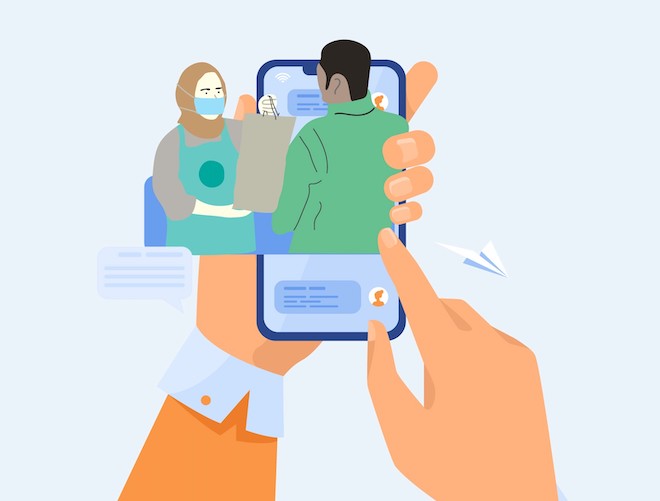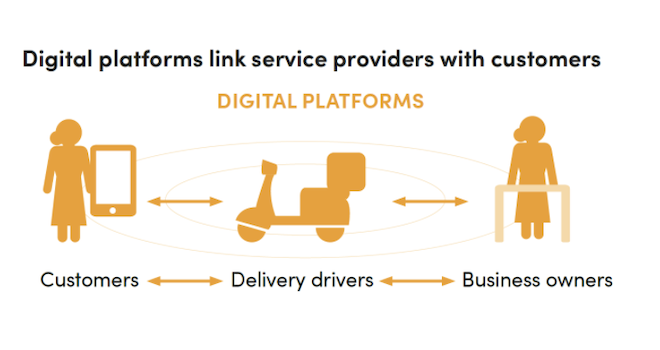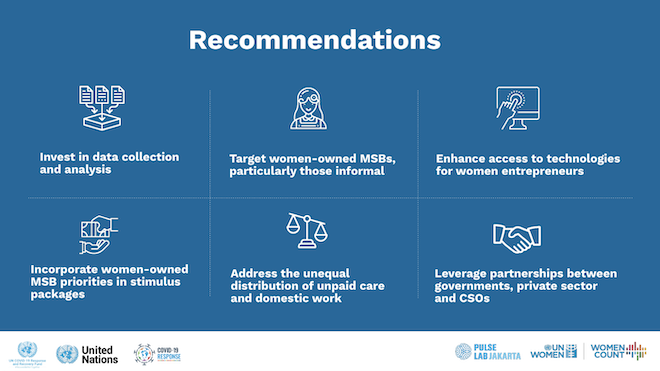
This article is published in collaboration with Pulse Lab Jakarta.
Women own or run nearly half of all micro and small businesses (MSBs) in Indonesia. These MSBs employ more than 90% of the Indonesian workforce. Despite this, there is a dearth of analysis dedicated to understanding the gendered impact and coping mechanisms of MSBs during the coronavirus disease (COVID-19) crisis, as physical distancing measures have led to declining incomes.
Pulse Lab Jakarta recently collaborated with UN Women, Gojek Indonesia, and the Indonesian National Council for Financial Inclusion for a mixed-methods research to understand the extent to which COVID-19 has affected women entrepreneurs and women-owned MSBs in Indonesia, with a focus on those in the food and beverage sector. With evidence suggesting that women who own and run MSBs are relying more on digital platforms to market their products and services, further understanding this phenomenon is critical for designing responsive programs and addressing gender inequalities that has been exacerbated by the pandemic.
A mixed-methods collaborative study
The collaborative study examines the difference in outcomes and coping strategies between women- and men-owned MSBs in response to the pandemic. The study focuses on the strategic utilization of digital platforms, defined here as online digital businesses that mediate work or services delivered between service providers and customers. For the purpose of this study, this excludes other applications considered digital tools or solutions, such as messaging applications, smart keyboards or other technologies.

UN Women teamed up with Gojek to conduct a survey covering 2,186 men- and women-owned MSBs across Indonesia that use Gojek’s digital platform. In addition, Statistics Indonesia shared the analysis of their nationwide survey on the impact of COVID-19 on businesses to provide a broader perspective on the use of digital tools among MSBs throughout the pandemic. Pulse Lab Jakarta led the qualitative component of the research, conducting digital observation and virtual in-depth interviews with 40 women and men MSB owners living in both urban and peri-urban areas across some of the major cities in Indonesia, namely Jakarta, Medan, Makassar, Semarang and Yogyakarta. We also talked to MSB owners that did not use any digital tools to learn how their perceptions and challenges in adopting technology differed.
Key Insights
Digital platforms are helping MSBs cope during the pandemic, with women-owned and younger businesses benefiting the most
The quantitative research found that the pandemic has pushed MSBs in Indonesia to adopt a range of digital tools, especially for newly formed businesses. The survey discovered that more than 80% of MSBs that use digital platforms see it as a part of their business survival mechanism and enable the owners to cover their essential personal needs. The survey also found that more women than men business owners reported that using digital platforms provided them with the time flexibility required to juggle home and work responsibilities at a time when domestic and care work are crucial. However, the qualitative research revealed that such benefits depended on other factors.
The extent to which digital platforms can be helpful for MSBs’ survival depends on their business characteristics, complementary strategies, and external factors
From the qualitative research, we discovered that micro-business owners could be characterized by one of two business orientations: either a necessity business owner who builds a business to support the family in making ends meet; or a growth-oriented business owner who has a vision and ambition to build a business from the ground up. These characteristics would influence gender dynamics within the business activities. For instance, compared to women in growth-oriented business, women in necessity businesses have to juggle domestic responsibilities with managing the business. Therefore comparatively, women necessity business owners are less likely to benefit from digitalization.

We also found that digitalization alone is not enough to help MSBs survive. They have to employ a range of strategies to complement the utilisation of digital tools which include changing the scope of the business, going the extra mile in improving service for other users within the platform ecosystem, and using additional digital tools to attract customers into the platform. In this case, the gender dynamics is also more visible among necessity business owners as they prefer to stick with digital tools that are easier to manage given their high domestic workload.
Our findings pointed to several external factors contributing to the adoption and utilisation of digital platforms. Both women and men MSBs owners, particularly women in necessity businesses, benefit from having technology facilitators—younger family members or friends who are more familiar with technology and are able to guide them through the process of adopting digital platforms. We also observed that businesses do better on digital platforms if their location is quite close to the platform customer base, often in city centers, because it decreases delivery time and cost. The qualitative research showed that location can be a disadvantage particularly among necessity MSBs owners living in peri-urban areas outside of Greater Jakarta. Finally, it is no surprise that owning a smartphone is an essential prerequisite that would allow MSBs to start utilizing digital platforms and benefit from them.
Many MSBs in Indonesia are still offline, but access and affordability are not always the issues
For micro and small businesses that were still offline or not using any digital platforms, unequal infrastructure, affordability, and digital capabilities were not the only limitations. Several of these businesses choose not to adopt digital platforms because digital platforms are perceived as more suitable for the food and beverage-related businesses compared to others. Those who focused on B2B (business-to-business) and walk-in customers found that using digital platforms was not as helpful. Another reason is that they intentionally limit their customer reach because they have limited production or storage capacity. However, the research also identified a specific barrier for women: time and mental constraints imposed by unpaid domestic and care work, which inhibit their ability to adopt and navigate new digital tools that could help their business survive during the pandemic.
Making use of the findings
You can find the complete findings and analysis on the gendered impact and coping strategies between women and men MSBs, details on the methodology, as well as our recommendations for policymakers in the full report (published in December 2020). Alongside the report, you can interact with survey data and selected insights from the qualitative research in this visualization tool to see how different types of MSBs are dealing with the pandemic.
We presented the research results in a public forum attended by representatives from the Indonesian Ministry of Women Empowerment and Child Protection, Indonesian Chambers of Commerce, and the Ministry of Cooperatives and Small and Medium Enterprises, and other relevant stakeholders in December 2020. Below are some of the recommendations we offered, which are also discussed further in the report.

The findings we presented on the two types of business orientation sparked an engaging discussion, which underscored that there should be no one-size-fits-all intervention when designing inclusive programming. Participants also outlined that training programs are crucial to help broaden access to technologies for women entrepreneurs, especially for women operating “necessity business.” One of the key opportunities being considered is how might such training be integrated within UN Women existing WeLearn training program.
Our research resulted in several policy recommendations on how to sharpen the government’s focus in helping women-owned businesses throughout the pandemic. However, in the spirit of enhancing access to digital technology for women entrepreneurs, we do not want to stop there. Currently, we are cooking up some design research to find ideas and opportunities to make technologies more accessible and useful for women business owners, particularly those who currently do not use digital platforms.
Authors: Lia Purnamasari (Design Researcher), Rizqi Ashfina (Research Assistant), and Maesy Angelina (Social Systems Lead)
Pulse Lab Jakarta Research Team: Maesy Angelina (Social System Lead), Nisa Fachry (Design Strategist), Aaron Situmorang (Research Coordinator), Kiana Puti (Research Assistant), Lia Purnamasari (Design Researcher) and Rizqi Ashfina (Research Assistant)
Illustration credit: Pulse Lab Jakarta and UN Women
The blog has been reviewed and edited by Dwayne Carruthers (Communication Manager) and Vitasari Anggraeni (Partnerships Officer)
This article was first published by Pulse Lab Jakarta on Medium on 27 January 2021.


